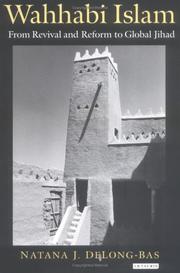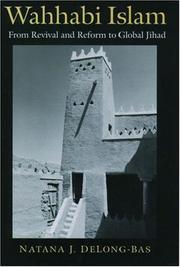| Listing 1 - 9 of 9 |
Sort by
|

ISBN: 1850436797 9781845113223 9781850436799 Year: 2004 Publisher: London : I.B. Tauris,
Abstract | Keywords | Export | Availability | Bookmark
 Loading...
Loading...Choose an application
- Reference Manager
- EndNote
- RefWorks (Direct export to RefWorks)
Wahhabiyah --- Islamic fundamentalism --- Islam --- Wahhabites --- Intégrisme islamique --- History. --- Doctrines. --- Histoire --- Doctrines --- Muhammad ibn 'Abd al-Wahhab, --- Wahhābīyah --- Intégrisme islamique --- Muḥammad ibn ʻAbd al-Wahhāb,
Book
Year: 2004 Publisher: Riyadh: International Islamic publishing house,
Abstract | Keywords | Export | Availability | Bookmark
 Loading...
Loading...Choose an application
- Reference Manager
- EndNote
- RefWorks (Direct export to RefWorks)
Wahhābīyah --- Islamic fundamentalism --- Islam --- Muhammad ibn Abd al-Wahhab, - 1703 or 4-1792

ISBN: 0195169913 Year: 2004 Publisher: Oxford ; New York : Oxford University Press,
Abstract | Keywords | Export | Availability | Bookmark
 Loading...
Loading...Choose an application
- Reference Manager
- EndNote
- RefWorks (Direct export to RefWorks)
Until September 11, 2001 few Westerners had ever heard of "Wahhabism." Now most of us recognize the word as describing an austere and puritanical type of Islam, mentioned frequently in connection with Osama bin Laden and Saudi Arabia and often named as the inspiration behind the 9/11 terror attacks. The word "Wahhabi" stems from the name of the founder of this system of thought, Muhammad Ibn Abd al-Wahhab (1702-1791), companion and religious adviser to Muhammad Ibn Saud, founder of the House of Saud. In this book Natana DeLong-Bas offers an in-depth study of the written works of al-Wahhab and demonstrates how it has been distorted into the extremist ideology now propagated by Osama bin Laden and his followers. Through a close reading of al-Wahhab's texts she demonstrates that many aspects of 20th- and 21st- century Wahhabi extremism do not have their origins in his writings but were added to Wahhabi teachings in the 19th century. She debunks the common journalistic portrayal of Muhammad Ibn Abd al-Wahhab as an illiterate, rural bumpkin with no scholarly formation. Her revisionist reading of al-Wahhab's thought will be controversial but impossible to ignore.
Islam --- Islamic fundamentalism --- Wahhābīyah. --- Wahhābīyah. --- Doctrines. --- History. --- Muḥammad ibn ʻAbd al-Wahhāb,

ISBN: 9780195333015 Year: 2004 Publisher: Oxford Oxford University Press
Abstract | Keywords | Export | Availability | Bookmark
 Loading...
Loading...Choose an application
- Reference Manager
- EndNote
- RefWorks (Direct export to RefWorks)
Digital
Publisher: Oxford Oxford University Press
Abstract | Keywords | Export | Availability | Bookmark
 Loading...
Loading...Choose an application
- Reference Manager
- EndNote
- RefWorks (Direct export to RefWorks)
The field of Islamic Studies is both wide-reaching and dynamic. It includes the range of foundational documents, traditions, institutions, and history of Muslims in various countries and regions throughout the world from the origins of Islam to the present day. This interdisciplinary field therefore includes history, religion, philosophy, anthropology, Arabic language and literature, as well as literatures in other languages including Persian, Turkish, and Urdu, and remains responsive to new discoveries, interpretations, ideologies and theories. The Internet makes access to staggering amounts of information easy – but it also raises important questions: What are the major issues and key developments in the field? Which sources are up-to-date and which are obsolete? Which works are pivotal in defining the discourse at various stages in its development? Which sources are considered accurate and balanced, and which represent simply a given individual or group’s position? These questions are important to keep in mind when undertaking any new study, but they are particularly critical in a dynamic and contested field such as Islamic Studies. Oxford Bibliographies in Islamic Studies combats this overload by providing expert guidance to the field in all its diversity and throughout its developmental stages. Top scholars in the field have contributed on their areas of expertise, so that users will understand how the field is organized and why it developed in the way it did. The articles present a guided tour through the key literature on each topic, providing context for its development, and a balanced overview of the major issues within a given topic.
Book
ISBN: 9780815637509 0815637500 9780815637530 9780815655459 Year: 2022 Publisher: Syracuse Syracuse University Press
Abstract | Keywords | Export | Availability | Bookmark
 Loading...
Loading...Choose an application
- Reference Manager
- EndNote
- RefWorks (Direct export to RefWorks)
"This edited volume examines the 18th century roots of the often-troubled marriage of politics and religion in the Muslim world and their impact on contemporary developments, including the globalization of Islam in the 21st century"--
Book
ISBN: 0815655452 Year: 2022 Publisher: Syracuse. New York : Syracuse University Press,
Abstract | Keywords | Export | Availability | Bookmark
 Loading...
Loading...Choose an application
- Reference Manager
- EndNote
- RefWorks (Direct export to RefWorks)
"This edited volume examines the 18th century roots of the often-troubled marriage of politics and religion in the Muslim world and their impact on contemporary developments, including the globalization of Islam in the 21st century"--
Book
ISBN: 0199325065 0199325057 0197569889 0199325081 0199325073 9780199325061 9780199325054 Year: 2018 Publisher: Oxford University Press, Incorporated
Abstract | Keywords | Export | Availability | Bookmark
 Loading...
Loading...Choose an application
- Reference Manager
- EndNote
- RefWorks (Direct export to RefWorks)
"Most Americans and Europeans have by now heard of Shariah. In the West, politicians, media commentators, televangelists, and others have stoked fears that Muslims intend to impose a repressive rule based on Shariah in America and Europe. Shariah has been portrayed as a medieval system that oppresses women, stifles human rights, and imposes harsh punishments like stoning and amputation. In reality, however, Shariah is a complex concept that has been interpreted in many ways over time and around the world. It plays a vital role in the lives of Muslims around the world, offering guidance on everything from personal morality to ritual practices, family life, and finance. In this timely addition to Oxford's What Everyone Needs to Know® series, John Esposito and Natana DeLong-Bas offer an accessible and thorough guide to this little-understood, but often caricatured system. The book provides clear and even-handed answers to a wide range of questions, covering the history, development, content, and practice of Shariah. What are its origins? What is a Shariah court and how does it work? How does a person become a Muslim in the eyes of Islamic law? Does Islamic law allow Muslims to marry non-Muslims? What are blasphemy laws, and how are they enforced? How does Islamic law govern trade and contracts of sale? Do Muslims in the West want Shariah Law? Is there a need to protect American and European societies from the imposition of Shariah? By answering the questions that so many people have about Shariah and its role in Muslim life, this book makes an invaluable contribution to the crucial task of fostering mutual understanding in our globalizing, pluralistic societies." -- Amazon.com.
Book
ISBN: 9782367601380 2367601380 Year: 2018 Publisher: Paris Editions Erick Bonnier
Abstract | Keywords | Export | Availability | Bookmark
 Loading...
Loading...Choose an application
- Reference Manager
- EndNote
- RefWorks (Direct export to RefWorks)
Depuis près de deux décennies, le wahhabisme, doctrine religieuse musulmane née au XVIIIe siècle dans la péninsule arabique, est directement relié aux excès et dérives sanglantes de l'islam politique. Mis en accusation, notamment en Occident, en raison de l'idéologie réactionnaire qu'il véhiculerait dans toute l'oumma grâce à la puissance financière de l'Arabie saoudite, pays où il constitue le pilier religieux du pouvoir monarchique, le wahhabisme demeure peu connu, qu'il s'agisse de ses enseignements, de ses principes fondamentaux ou même de ses débats théologiques internes. Si l'affaire semble entendue - ne parle-t-on pas désormais de "déwahhabisation" ? - le présent ouvrage se penche sur des aspects moins connus de ce courant religieux. Tendances réformistes, engagement caritatif, aide aux populations musulmanes en difficultés, le wahhabisme revendique une autre approche de l'islam que celle qu'on lui prête et engage à porter plus d'attention aux écrits et enseignements d'Abd al-Wahhab, le fondateur de ce courant religieux. Le wahhabisme représente-t-il une menace permanente pour les intérêts européens et américains ? Est-il aussi monolithique qu'on le prétend ? Est-il nécessairement opposé à la civilisation et aux valeurs occidentales ? Légitime-t-il vraiment le djihad contre les non-musulmans, mais aussi contre les non-wahhabites ? Autant de questions liées à l'actualité auxquelles cet essai érudit et précis entend répondre.
Wahhabites. --- Intégrisme islamique. --- Islam --- Doctrines. --- Ibn 'Abd al-Wahhāb, Muḥammad --- Wahhabites --- Wahhabiyah --- History --- Muḥammad ibn ʻAbd al-Wahhāb, --- Muhammad Ibn Abd al-Wahhab --- les origines du wahhabisme --- théologie --- vision du monde --- sources théologiques --- le Coran --- les hadiths --- interprétation --- la Communauté musulmane originelle --- Oumma --- les quatre califes bien guidés --- le tawhid --- théologie du monothéisme absolu --- le shirk --- sanctuaires --- tombeaux --- mosquées --- tombes --- idolâtrie --- demandes d'intercession auprès de Dieu --- utilisation d'amulettes, de charmes et de talismans --- sorellerie --- vouloir connaître l'avenir --- sortilèges magiques --- expression de la foi --- la volonté de Dieu --- la foi --- Iman --- l'incrédulité --- kufr --- soufis et chiites --- la loi islamique --- séparation entre le divin et l'humain --- droit islamique --- la Sunna --- le qiyas --- l'ijma' --- instruments juridiques pour l'interprétation de la loi islamique --- maslahah --- naskh --- taqlid --- ijtihad --- Ibn Taymiyya --- le mujtahid --- les madhahib --- écoles de la loi islamique --- le fiqh --- le mufti --- littéralisme --- ritualisme --- waqf --- les femmes et les wahhabites --- droits des femmes --- mariage --- sexualité --- mécanismes du mariage --- Nikah --- Nafaqah --- talaq --- khul' --- li'ân --- le djihad --- islam --- violence --- le savoir religieux et l'éducation --- islam et politique --- la da'wah --- prisonniers de guerre --- propriété --- responsabilités de l'imam --- responsabilités de l'émir --- conversions à l'islam après le djihad --- la retraite du djihad --- oeuvres d'Ibn Abd al-Wahhab --- oeuvres des modernistes musulmans --- fondamentalistes --- les Ottomans --- Sayyid Qutb --- le radicalisme islamique contemporain --- Oussama Ben Laden --- le djihad mondial
| Listing 1 - 9 of 9 |
Sort by
|

 Search
Search Feedback
Feedback About UniCat
About UniCat  Help
Help News
News